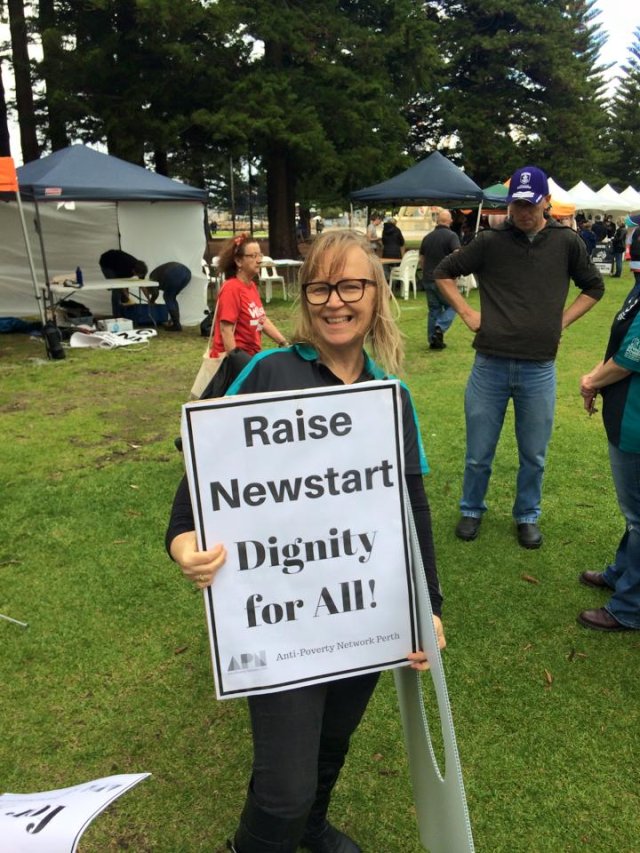
The grassroots campaign to increase welfare payments for the unemployed received a boost on June 12 from the national body that represents councils across Australia.
The Australian Local Government Association (ALGA) overwhelmingly voted in support of a motion calling on the federal government to increase the Newstart Allowance, the Centrelink payment for unemployed people.
Newstart is currently $278 per week, making it $160 per week below the Henderson poverty line and $178 per week below the p-ension. It has not been raised in real terms since the 1994 federal budget, when then-prime minister Paul Keating raised the payment by $2.95 per week.
ALGA’s historic decision was made possible by a sustained, disciplined grassroots campaign targeting local councils, which began in South Australia last year and has since expanded to other states.
The campaign lobbied mayors and councillors, sharing stories of the hardships faced by welfare recipients. It was led by unemployed residents and others on meagre payments including members of Anti-Poverty Network SA, Australian Unemployed Workers' Union and Anti-Poverty Network WA.
Last August, the City of Port Adelaide Enfield, in Adelaide’s northwest, became the first council in Australia to call for Newstart to be raised. Since then 13 other councils, from South Australia, Victoria and Western Australia, have voted to support increasing Newstart.
The motion passed at the ALGA National General Assembly in Canberra, moved by Moreland Council in Victoria, stated: “In light of the burden placed on local governments across Australia to respond to the needs and challenges of people living in poverty and homeless, the National General Assembly calls on Federal Government to raise the Newstart Allowance to the level of the Henderson Poverty Line [the disposable income required to support the basic needs of a family of two adults and two dependent children] to increase the wellbeing and life chances of many in our community.”
The motion was originally moved in Moreland Council by Socialist Alliance councillor Sue Bolton.
An increase to Newstart, and not just a token increase but a significant one, is just, necessary and affordable. A $75 per week increase, as demanded by the Australian Council of Social Services (ACOSS), by no means a sufficient increase, would cost less than the government’s income tax cuts — $10 billion versus $13 billion, over four years, according to ACOSS. What those out of work, competing for jobs in an economy where there is one job for every ten job-seekers, receive is not an adequate, let alone comfortable, income.
As Aidan, a Newstart recipient and member of Anti-Poverty Network SA, put it: “If I got an extra $20 per week, I could have breakfast every day; if I got an extra $50 per week, I could also have lunch every day; if I got an extra $75 per week, I could also have dessert once a week.”
ALGA’s decision to formally call for an increase to Newstart continues a groundswell of institutional and popular support for a raise to Newstart.
Earlier this month, an Essential Media poll confirmed what those who campaign for dignity and justice for the unemployed have long suspected: a majority support increasing welfare payments. According to the poll, 68% support raising Newstart. This followed a survey by progressive think-tank Per Capita, the results of which were released in May, which showed that 55% of the public support increasing spending on welfare.
Over the past few months, Deloitte Access Economics, the Council of Small Business, the Australian Industry Group and, incredibly, former Prime Minister John Howard — whose government did much to create today’s impoverishing, punishing welfare system — have all acknowledged the need for a long-overdue rise in Newstart.
The Coalition’s response — of course — has not been to increase Newstart but to reduce it, by seeking to remove the Clean Energy Supplement, which would lower Newstart by $8.80 per fortnight.
What is the Labor Party’s position? Exactly where you might expect: hedging its bets.
Labor has opposed scrapping the Clean Energy Supplement and Opposition Leader Bill Shorten and other party figures have acknowledged that $40 a day (or $17 a day, after rent is paid, according to the Salvos) is not an adequate income. But time and time again, Labor has stopped short of committing, firmly and clearly, to raising Newstart (ACT Chief Minister Andrew Barr being the only exception).
Instead, Labor promises nothing more than a “root-and-branch” review of welfare payments, essentially the same promise it took to the last federal election in 2016.
Despite the change in community sentiment and the ever-growing body of research on the profound impacts of the abysmal Newstart on the health and quality of life of recipients, Labor has not yet moved beyond a position that basically tells those out of work and living in poverty: “We cannot and will not promise you a raise, but trust us anyway.”
Indeed, there is little reason to trust Labor. In May, it joined with the Coalition to defeat a Greens motion in the Senate, which called for a $75 per week increase to Newstart, labelling the motion “a stunt”.
Labor’s national conference, its highest decision-making body, is scheduled for December. It will likely be Labor’s last gathering before the next federal election (unless an early election is called) and there is likely to be a showdown about Newstart.
In the meantime, the growing anti-poverty and unemployed-rights movements and the diverse coalition of local councils, trade union, community and other organisations have six months to exert maximum pressure on the out-of-touch politicians to grant an increase in income to those already living well below the poverty line.
[Pas Forgione is the Coordinator of Anti-Poverty Network SA.]